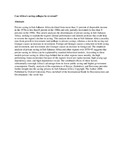| dc.contributor.author | Ibrahim, A. Elbadawi | |
| dc.contributor.author | Mwega, Francis M. | |
| dc.date.accessioned | 2013-05-16T08:08:58Z | |
| dc.date.available | 2013-05-16T08:08:58Z | |
| dc.date.issued | 2000 | |
| dc.identifier.citation | World Bank Economic Review | en |
| dc.identifier.uri | http://econpapers.repec.org/scripts/search/search.asp?ft=Francis+Mwega | |
| dc.identifier.uri | http://erepository.uonbi.ac.ke:8080/xmlui/handle/123456789/23510 | |
| dc.description.abstract | Private saving in Sub-Saharan Africa declined from more than 11 percent of disposable income in the 1970s to less than 8 percent in the 1980s and only partially recovered (to less than 9 percent) in the 1990s. This article analyzes the determinants of private saving in Sub-Saharan Africa, seeking to explain the region's dismal performance and identify policies that could help to reverse the region's decline in saving. The analysis shows that in Sub-Saharan Africa causality runs from growth to investment (and perhaps to private saving), whereas a rise in the saving rate Granger-causes an increase in investment. Foreign aid Granger-causes a reduction in both saving and investment, and investment also Granger-causes an increase in foreign aid. The empirical analysis of private saving in Sub-Saharan Africa and other regions over 1970–95 suggests that private saving in Africa can be explained by standard behavioral models. According to these models private saving in Africa lags behind that in other regions (most notably, the high performing Asian economies) because of the region's lower per capita income, high young-age dependency ratio, and high dependence on aid. The combined effects of these factors substantially outweigh Africa's advantage from its lower public saving and higher government consumption. Finally, analysis of the experiences of Kenya, Zimbabwe, and Botswana provides further insight into the saving process in Sub-Saharan Africa. Copyright The Author 2000. Published by Oxford University Press on behalf of the International Bank for Reconstruction and Development / the world bank | en |
| dc.language.iso | en | en |
| dc.relation.ispartofseries | Vol. 14, issue 3, pages 415-443 (2000); | |
| dc.title | Can Africa's saving collapse be reversed? | en |
| dc.type | Article | en |
| local.publisher | School of Economics, University of Nairobi | en |

